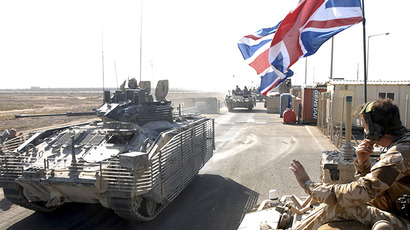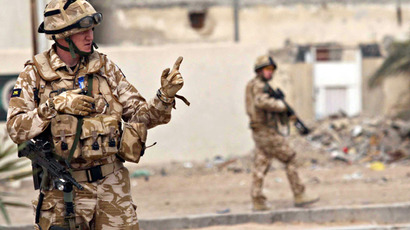Using more contractors, drones may help sell wars to public, British MoD study suggests
Using more mercenaries, unmanned vehicles and elite forces could make the British public more willing to support future wars, given such losses do not rile the press as do deaths of regular soldiers, a strategic unit of the Ministry of Defence suggests.
In an internal discussion paper on how to sway “casualty
averse” public opinion, the MoD development, concepts and
doctrine centre (DCDC) also recommends lessening the public
profile of repatriation ceremonies for war casualties.
The document, written in November 2012 and obtained by the Guardian under the Freedom of
Information Act, regards how public opinion of wartime
casualties can be manipulated. It also recommends the Ministry of Defence (MoD) have “a clear
and constant information campaign in order to influence the major
areas of press and public opinion.”
The eight-page document says to support a campaign to influence
public acceptance of war, MoD could "reduce the profile of the
repatriation ceremonies,” a reference to public processions
of flag-draped hearses carrying war dead through towns near Royal
Air Force bases where the bodies are returned home.
Deborah Allbutt, whose husband was killed in Iraq in 2003, said
the proposals to alter repatriation ceremonies is akin to
"brushing the deaths under the carpet.”
"They are fighting and giving their lives. Why should they be
hidden away? It would be absolutely disgraceful,” she told
the Guardian.

DCDC’s paper recommends reducing “public sensitivity to the
penalties inherent in military operations" and that MoD should
"inculcate an attitude that service may involve sacrifice and
that such risks are knowingly and willingly undertaken as a
matter of professional judgment.”
The paper maintains the MoD should clearly communicate reasons
for going to war and convince the public they have a stake in the
conflict. Thus, they will accept casualties more as a consequence
of military action.
In “cases where the public is unconvinced of the relevance of
the campaign to their wellbeing they are not prepared to condone
military risk and are acutely sensitive to the level of
casualties incurred,” the paper said.
DCDC goes on to claim the war campaigns in Iraq and Afghanistan
should not convince MoD the public is now more “risk
averse.”
“This assertion is based on recent, post-2000 experience and
we are in danger of learning false lessons concerning the
public's attitude to military operations," the paper, which
has no named author, said.
The report includes a comment on the information struggle posed
to MoD by “opponents.”
"The public have become better informed and our opponents more
sophisticated in the exploitation of the sources of information
with the net result that convincing the nation of the need to run
military risks has become more difficult but no less
essential."

DCDC recommended more use of unmanned autonomous systems,
cyber-attacks and “contractors” to blunt worry over MoD casualty
numbers.
"Neither the media nor the public in the West appear to
identify with contractors in the way that they do with their
military personnel. Thus casualties from within the
contractorised force are more acceptable in pursuit of military
ends than those from among our own forces."
The paper also suggested the public does not care as much about
deaths among special forces given the risk involved, or
perceived, in their activities.
"The public appear to have a more robust attitude to SF
[special forces] losses."
Referring to a May 1982 helicopter crash, it says: "The loss
of 19 SAS soldiers in a single aircraft accident during the
Falklands campaign did not arouse any significant comment."
An MoD spokesman told the Guardian: "It is entirely right that
we publicly honour those who have made the ultimate sacrifice and
there are no plans to change the way in which repatriation
ceremonies are conducted. A key purpose of the development,
concepts and doctrine centre is to produce research which tests
and challenges established doctrine and its papers are designed
to stimulate internal debate, not outline government policy or
positions. To represent this paper as policy or a potential shift
of policy is misleading."














